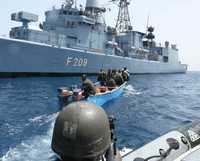Hundreds of Somali pirates have transformed the Gulf of Aden and the Indian Ocean into the world's most dangerous waters. But this Sunday, on the Indian Ocean, a group of Somali pirates didn't know what they were getting into. The 11 young men -- armed with rockets, guns and explosives and riding in three small boats -- spotted a vessel on the horizon and moved to attack. The "victim" vessel maneuvered into the sun, partially blinding the attackers. When their vision cleared, the pirates probably realized they'd made a huge mistake: rather than the defenseless merchant vessel they apparently thought they were pursuing, the ship turned out to be a heavily armed French frigate, the Nivose, assigned to the European Union counterpiracy force, Atalanta. Armed boats and a helicopter quickly sortied from Nivose to take the pirates into custody. The steady rise in piracy off the Somali coast -- around 100 large vessels attacked so far this year, compared to a similar number in all of 2008 -- seems inconsistent with eyewitness and expert testimony that paints Somali pirates as disorganized and even amateurish. That suggests that increasingly sophisticated and effective criminal networks are relying on poorly trained foot soldiers to carry out pirate attacks that often fail out of sheer incompetence. The dissonance has potentially grave implications.
War is Boring: Amateurish Foot Soldiers Belie Sophisticated Piracy Networks

